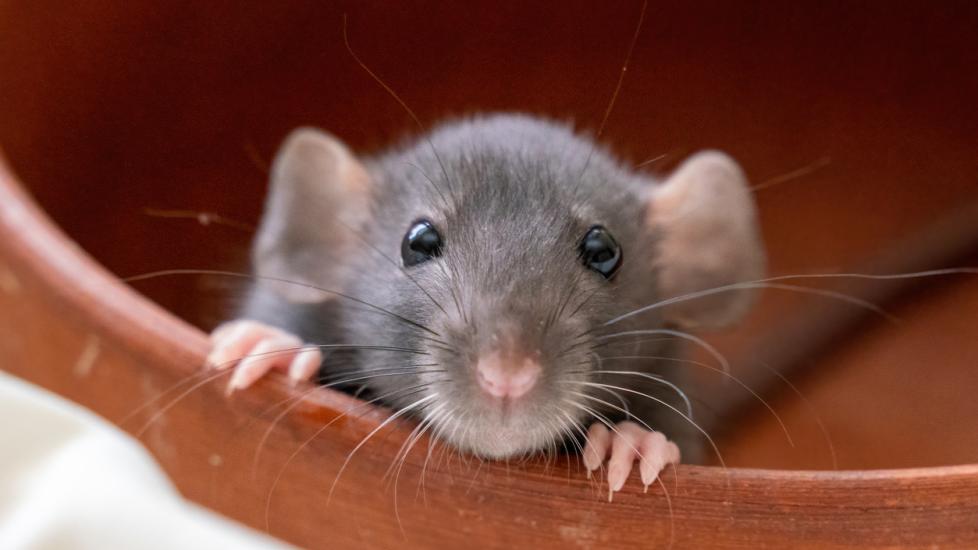How Long Do Rats Live?
Rats can be terrific and entertaining pets. They rarely bite, are easy to keep, and are highly social and intelligent. Like all pets, life expectancy should be evaluated before bringing them home, in addition to researching all aspects of the species.
While some small mammals, like rabbits and ferrets, may live to 10 years old, pet rats typically only live 2-4 years in captivity. This relatively brief time commitment makes them ideal pets for some people, but not if you’re looking for a more long-term companion.
Average Rat Lifespan and Aging
Rats typically have short life stages. Domesticated pet rats normally only live 2-4 years–but the longest living rat in captivity lived to be 7 years old! A pet rat’s life expectancy is much better than their wild counterparts, though, who typically live less than a year. Wild rats are subject to predation, disease, and lack of adequate food, water, and veterinary care—all resulting in a shortened life.
Rats have very high metabolisms and incredibly high heart rates (300-500 beats per minute), which is partially why they have such short lifespans. Genetics also have a role in determining how long an animal lives. While all rats have short lifespans compared to other domestic pets, some breeds may have slight disadvantages. For example, hairless rats typically have more health issues, resulting in a shorter life expectancy. Inbreeding can also shorten a pet rat’s lifespan by introducing mutations and deformities.
Rats are typically sexually mature around 37-75 days old. You can differentiate males from females by around 3-4 weeks old. Females typically live longer and mature earlier than males. A female rat is pregnant 21-23 days and can have 6-13 babies in each litter. Young rats wean when they are 21 days old and are soon after also sexually mature.
What Makes Some Rats Live Longer Than Others?
Genetics and inbreeding can play a significant role in health conditions and lifespan of pet rats. However, most life-threatening health conditions in pet rats are secondary to poor husbandry. Husbandry is an all-encompassing term relating to the habitat, diet, and care of animals.
The best way to keep a pet rat happy and healthy for as long as possible is to perform plenty of research before adopting them. A proper diet is crucial! Make sure they have good quality pellets and are offered some vegetables daily, in addition to fresh water. Small, occasional amounts of fruit or lean meat are also recommended. Watching your pet rat’s weight so they don’t get obese will also decrease health conditions later in life.
Rat teeth are constantly growing, which means they need to chew and gnaw throughout the day. Make sure to provide the appropriate toys and chews to continuously wear down their teeth. Tooth overgrowth and misalignment are another common pet rat problem that can mostly be avoided with the right chews.
How to Improve Your Rat's Lifespan
With a few easy tips and tricks, you can be well on your way to a happy and healthy pet rat! Whether you are doing research before bringing a rat home or if you already have a pet rat, here are some ways to improve husbandry:
-
Frequent (every 6-12 months) veterinary examinations.
-
Periodic bloodwork and fecal parasite testing with your veterinarian.
-
Weigh your pet rat weekly with a gram scale to document any changes.
-
Feed only rat-specific pellets. Talk to your veterinarian about how much to feed.
-
Offer vegetables daily and occasional fruit or lean meat, like chicken.
-
Keep their cage clean and free from waste odors that can cause upper respiratory issues.
-
Keep the room temperature between 65 and 80 degrees Fahrenheit and 40-70% humidity.
-
Never feed seeds or seed-based diets as they do not provide appropriate nutrients and can lead to weight gain.
-
Monitor your pet rat for any changes in hair coat, behavior, weight loss, or swellings. Weight loss is the most common first sign of a sick pet rat.
-
Rats are social creatures and prefer to live in groups. However, ensure large enough cages sizes to avoid overcrowding.
-
To reduce the risk of mammary cancer, some veterinarians may recommend spaying and neutering rats before they are 5-7 months old.
-
Rats have poor eyesight–make sure they are safe when they are roaming outside their cage. This includes no access to cords or tight spaces where they can get stuck.
-
As a prey species, rats should not be allowed to roam free with dogs, cats, or ferrets.
-
Do not use wire floors, which can cause dermatitis.
-
Rats are social and intelligent and require mental stimulation. Let them out of their cage at least 30 minutes a day. Rotate toys and chews to provide enrichment.
-
Rats enjoy exercise wheels, but make sure they are solid as to not cause injury.
References
Help us make PetMD better
Was this article helpful?
